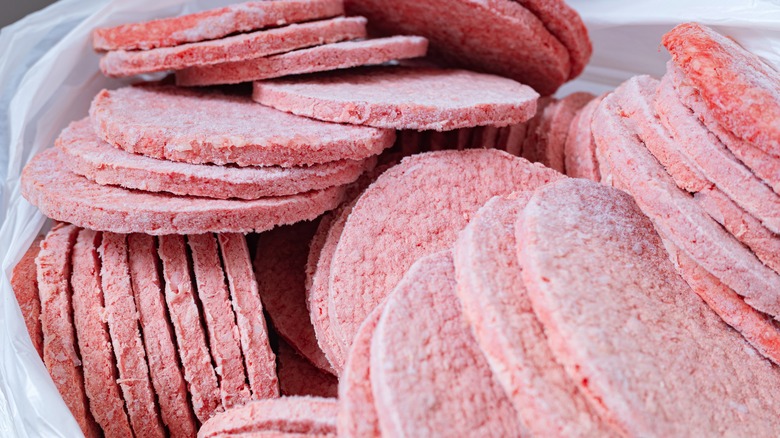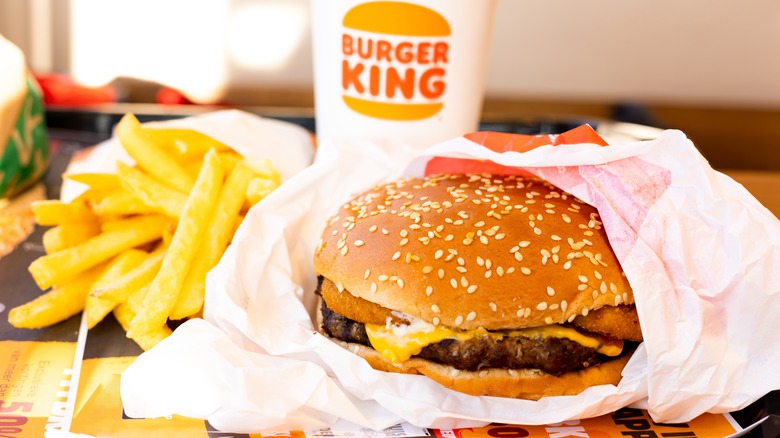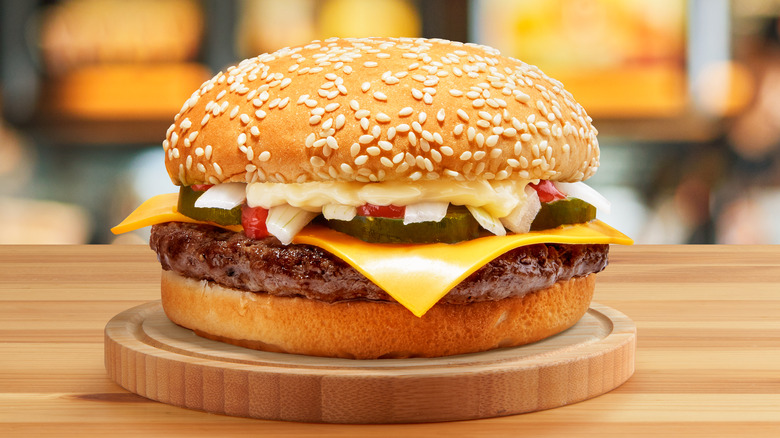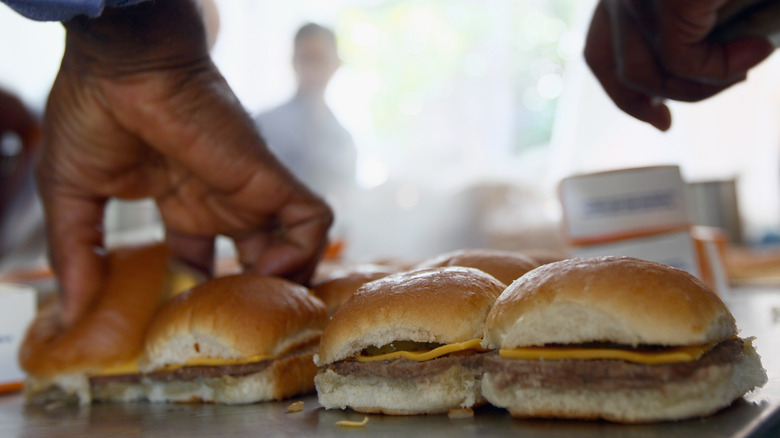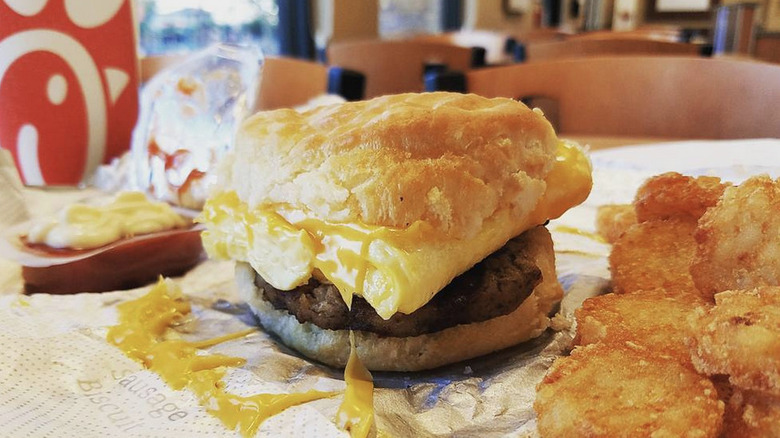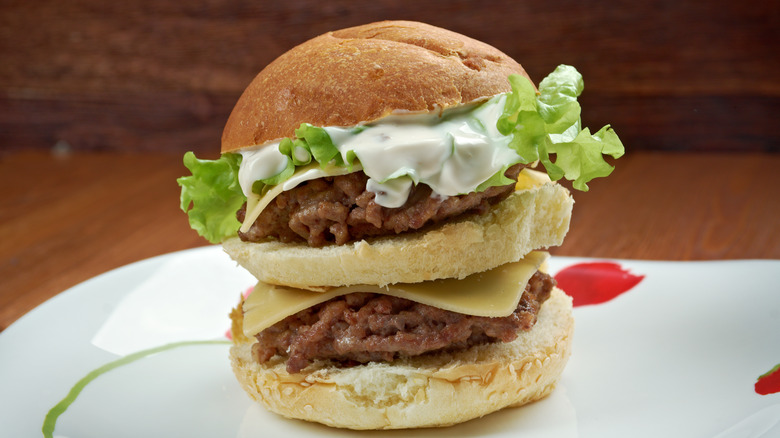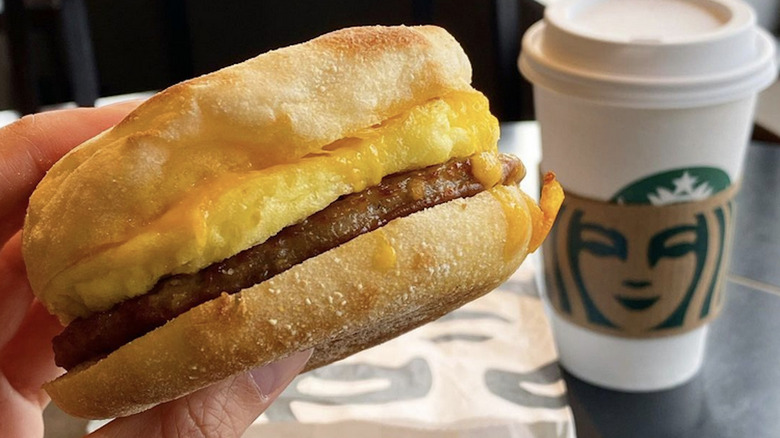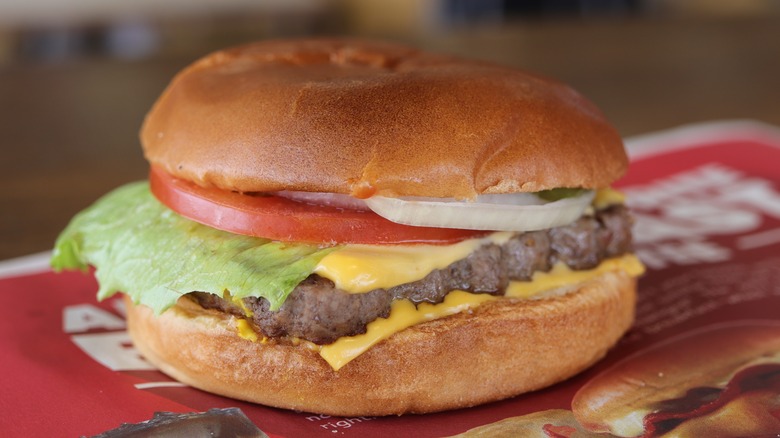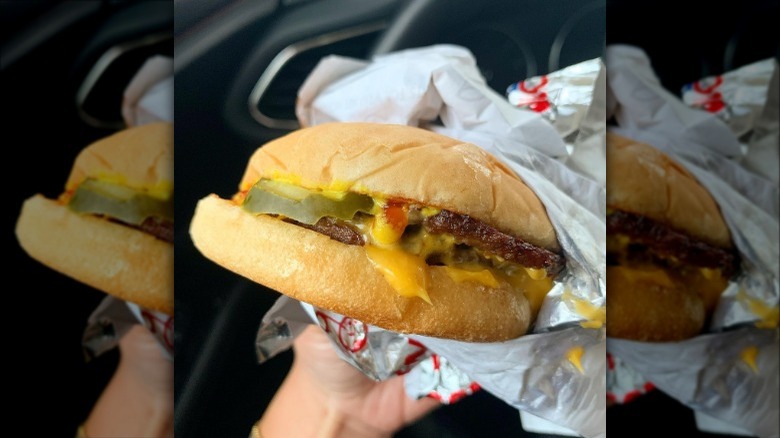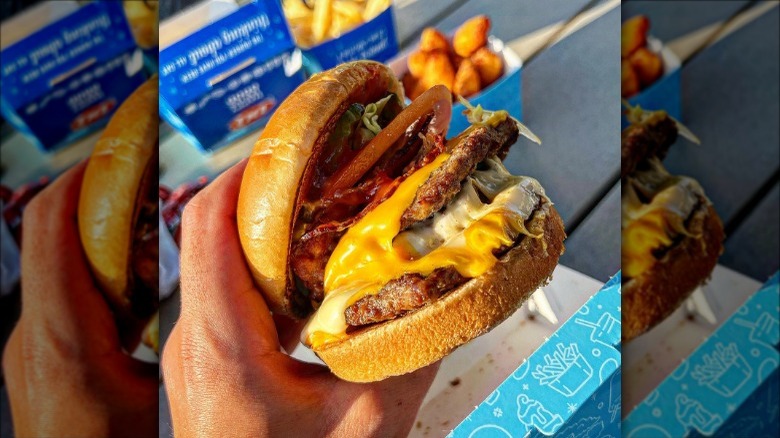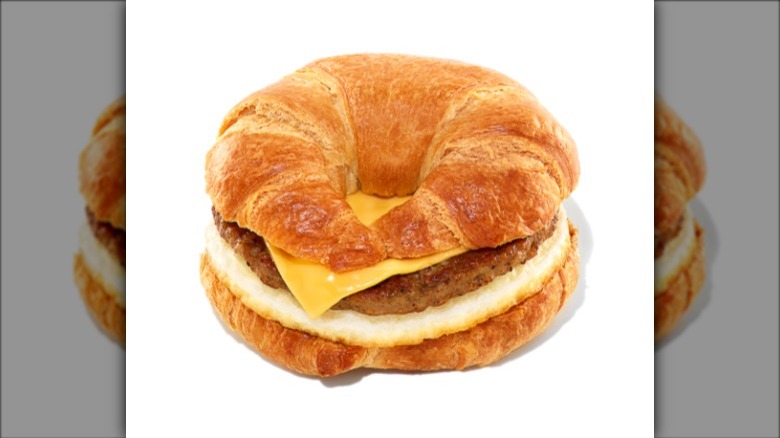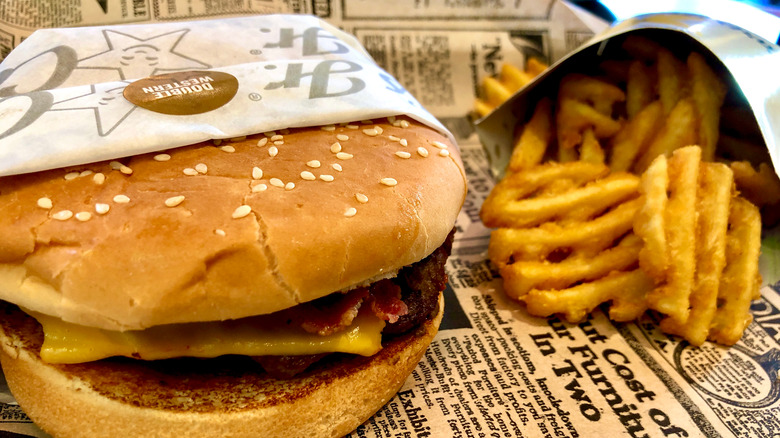Fast Food Chains That Use Frozen Patties
In recent years, fast food chains that use fresh beef have been championing their use of never frozen patties as if they were the holy grail of flavor, texture, and quality. But is fresh meat actually better than frozen? Chains like In-N-Out Burger, Five Guys, and Whataburger clearly think so, and Wendy's has made its opinion crystal clear with ad campaigns mocking competitors like McDonald's and Burger King for using frozen meat. This type of marketing might make you think that fresh patties are superior, especially considering that restaurants that use frozen patties rarely advertise it, but it turns out that fresh isn't necessarily better.
For one thing, researcher Ronald Pegg revealed to the Tufts University Health & Nutrition Letter that flash-freezing food when it's at its freshest "maintains freshness, slows down enzymatic reactions, increases the time it takes anything to degrade," allowing restaurants to store food longer without compromising its taste or nutritional value. According to the USDA, freezing can also prevent the spread of life-threatening bacteria like listeria, something that refrigeration cannot. Ultimately, both fresh and frozen patties can be delicious. Whether you like or loathe the idea of eating a formerly frozen patty, keep scrolling to find out which fast food chains use them.
Burger King
Burger King makes a big deal about its flame-grilled Whoppers, and the marketing is true. A former BK employee took to Reddit to reveal the details, explaining that the chain uses broilers with flame grills inside. What the company isn't advertising, however, is that those patties are frozen before being tossed on the grill. Workers place the patties on a tray and put it into the broiler, the former employee explained. Once they're cooked, they're placed in a warm storage area where they can stay for up to 40 minutes before being discarded. Eagle-eyed Burger King customers can even see evidence of the process in real-time. According to the employee, if you see smoke coming off the roof of one of its restaurants, it's a telltale sign that a new batch of burgers is hot off the grill.
For a fast food establishment as ubiquitous as Burger King, it's no wonder it prefers to use frozen patties. The logistics of distributing fresh meat across the country without raising a health risk or building hundreds of distribution hubs would be challenging, especially considering its pledge to avoid preservatives and use 100% beef. While Burger may not be able to rely on freshness as an advertising angle, that doesn't seem to hurt its sales. Burger King identifies itself as the second largest fast food burger chain in the world, and claims to have sold 500 million Whoppers in 2022 in the U.S. alone.
McDonald's
With more than 36,000 restaurants in over 100 countries, McDonald's is a behemoth of the fast food industry. Even though it's the go-to comfort food for people the world over, the Golden Arches has faced its fair share of criticism for the greasy, processed items on its menu. However, there are a number of healthy food options on the McDonald's menu using ingredients like sustainably sourced fish and freshly cracked eggs. McDonald's also switched from frozen to fresh burger patties for its Quarter Pounder in 2018, but what the food chain doesn't emphasize is that the rest of its patties are still frozen.
That's right, the Golden Arches may be turning to fresher foods, but Big Macs, the McDouble, the cheeseburger, and all the other patties that aren't used for Quarter Pounders are frozen. The restaurant says that its patties are flash-frozen to lock in flavor. It even adds that two to three weeks can elapse between when patties are formed and when they're served. This level of transparency surrounding frozen patties is unusual and allows consumers to make informed decisions, but if you're ordering a Quarter Pounder because you've heard they're now fresh, it's worth reading the fine print. McDonald's only claims that the burger comes from fresh patties in most parts of the continental U.S., and it doesn't extend to Hawaii, Alaska, or U.S. territories.
White Castle
White Castle has nothing to prove. Out of all the big-name burger-slinging chains out there, only White Castle can claim to be the first fast food hamburger joint. With its iconic sliders and mechanized production line, it was a novelty that took the nation by storm in 1921 and kicked off an entire industry. And while other restaurants hide their use of frozen patties, White Castle is pretty open about it. In 1931, nearly two decades before it patented its five-holed burger, it started using frozen patties. Don't mistake this for low quality though. Since it opened over a century ago, White Castle has made up for its modest size with unwavering attention to detail.
To make that signature mouth-watering flavor, the chain heats the frozen patties on top of onions and water. This unique cooking technique means that White Castle sliders are steamed and suffused with that signature oniony flavor rather than grilled. The added effort required for this technique is balanced out by the signature five-holed patty structure. Invented by an employee during a surge in demand in the late '40s, the design enables the burgers to cook on both sides without having to be flipped according to the chain's Vice President Jamie Richardson. Say what you will about frozen patties, but White Castle has its system dialed to an exact science, and the flavor speaks for itself.
Chick-fil-A
Chick-fil-A has achieved an almost impossible feat: Delivering fresh meat to all its branches throughout the U.S. Burger King can be found in nearly every town across the country but the logistical challenges of delivering perishable ingredients to so many locations mean it's never made the switch to fresh meat. In-N-Out, in contrast, places freshness at the heart of its business model, but has resisted the temptation to expand to the East Coast due to the difficulties of distributing fresh patties across long distances. Chick-fil-A has managed to serve fresh, never frozen chicken at over 2,600 restaurants located all over the country. This impressive accomplishment has paid off, making it one of the largest fast food chains in the U.S. with customers lining up around the block to get their hands on some freshly fried goodness. But not all its meat is fresh.
Chick-fil-A's menu is more than just waffle fries and chicken sandwiches. Its freshly baked biscuits, for example, have various fillings including a sausage patty that doesn't claim the same level of freshness. An employee confirmed to Mashed that the patties arrive frozen and are thawed for at least 24 hours before cooking to avoid a raw center. While this prevents the patties from being advertised in the same way as the chicken, it does not affect the taste, which is as salty and flavorful as fans of its chicken sandwiches could hope.
Jack in the Box
Jack in the Box is an all-rounder in the fast-food industry. If you're looking for a quick meal to satisfy a picky group of eaters, it's your best bet. From sandwiches and salads to 24-hour breakfast and those strangely compelling tacos (around 554 million of them are sold each year), the chain has a plethora of affordable options. There are even egg rolls. While the menu is more varied than what many of its competitors have to offer, Jack in the Box sells more burgers than any other item. With mouth-watering options like the Sourdough Jack and the Bacon Ultimate Cheeseburger, the restaurant keeps customers coming back for more. But while it only uses 100% beef, the patties are frozen.
According to one employee in a Reddit Ask Me Anything, the burgers are frozen along with just about everything else. In response to a question about which menu items were freshest, the employee wrote, "Everything is frozen, so there really isn't anything that's 'fresh,' unless you count the salads but the chicken that goes into it is frozen." While it may disappoint burger purists to learn that everything in their order is reheated, Jack in the Box is just one of many chains that have chosen to keep their supply chains efficient with frozen food, and if its nearly $1.5 billion yearly revenue is anything to go by, it has no reason to change.
Starbucks
Mention the name "Starbucks" and you'll conjure images of a takeaway cup of coffee or a Pumpkin Spice Latte, but for those who need a little more substance in the mornings than a liquid hit of caffeine, there are plenty of food options to choose from. The chain made a name for itself as the first establishment to serve decent coffee on a grand scale in a fast food setting, but its food has a lot less ambition behind it. For years, employees have been revealing what Starbucks doesn't want you to know about its food, including the fact that every non-beverage item on the menu is frozen. From croissants to coffee cake, everything is delivered to restaurants on ice and reheated before serving, including the sausage patties in its English muffin breakfast sandwiches.
One of the reasons many Starbucks customers assume the chain uses fresh food is savvy marketing and interior design. The chain has cultivated an upscale image since it opened in 1971 and uses psychology to get customers to spend more. This includes putting food in a literal spotlight to draw your attention to it and making its menu visually engaging. Employees have joked on Reddit about customers who think there's a "Sous Vide chef in the back making our egg bites," but with the company's aggressive marketing and design tactics, cultivating assumptions like this is part of the business model.
Wendy's
It may come as a shock to burger enthusiasts to learn that Wendy's famous claim of "fresh, never frozen" patties comes with a caveat. The restaurant has gone out of its way to align itself with fresh meat since it opened in 1969, long before food transparency was a popular marketing ploy. And yet, not every person who buys a burger from Wendy's will be eating a never-frozen patty.
It turns out that fresh patties are only available in the mainland U.S. along with Alaska and Canada. That leaves out about 29 other countries and U.S. territories in which there is no guarantee of freshly made burgers (though they share the same iconic square shape). Wendy's confirmed via its famously saucy Twitter account that its Hawaii restaurants use frozen patties. In a thread concerning which state was excluded from its fresh, never frozen guarantee, @Wendys replied, "Good question! The other state is Hawaii, and since they're 2,500 miles into the ocean we cannot guarantee never-frozen beef." It's hard to argue with that. Wendy's claims to make between 12,000 and 14,000 deliveries of fresh patties in refrigerated trucks to its restaurants each week within the continental U.S. to ensure their quality, so it's not surprising that expanding this operation to the rest of its 6,500 restaurants would be an impractical undertaking.
Sonic
Sonic has won over American diners with its rollerblading servers and classic drive-in theme, and its menu is just as iconic. Aside from slushes and Cherry Limeade, diners can treat themselves to beloved food fixtures like tater tots, corn dogs, and mozzarella sticks. Its burgers may undergo more frequent tweaks and improvements, but one thing about them is just as consistent: they're all stored frozen before they make it into your hands. An employee at Sonic confirmed as much to Mashed, saying that the patties are thawed and heated on the grill after being removed from the freezer.
The burgers aren't the only hot food at Sonic that starts in the freezer. According to a Reddit Ask Me Anything thread from a former employee, nearly all the food is stored frozen. This may not sound particularly appetizing, but with a steady stream of mouthwatering limited-time offerings, from the Garlic Butter Bacon Cheeseburger to the Dill Pickle Cheeseburger, Sonic's burger credentials are unassailable. And if you're still holding out hope that it might someday make the switch to fresh meat, it may only be a matter of time. In 2021, Scott Uehlein, the vice president of product innovation and development for the restaurant chain, told Mashed that the company is making "incremental yet meaningful ingredient improvements that guests may not immediately notice, but together result in an overall better burger experience." Now that it's upgraded to lighter buns and thicker patties, fresh beef might be on the horizon.
Dairy Queen
Most people go to Dairy Queen craving frozen comfort food, but a frozen burger doesn't have quite the same allure as a Chocolate Dipped Cone or a Butterfinger Blizzard. In fact, at least one employee has advised customers to avoid eating the savory food altogether. In response to a Quora comment asking which menu items to stay away from at the restaurant, the employee cautioned against the ready-made options, saying that the sandwiches are all frozen until a customer orders one. "[A]lmost all of our ice cream products are generally clean, safe, and very delicious," the employee added, "That's what DQ is known for. NOT food." That's a burn that could melt even the most frosty burger patty.
While the food menu has its detractors, Dairy Queen has made a concerted effort in recent years to make its name as synonymous with burgers as it is with soft serve, launching five variations of its Stackburger in 2022. For those hoping DQ might continue its upward trajectory by switching to fresh patties, you'll likely have to wait a while longer. The restaurant chain has struggled with closures since the late 2010s, and its lack of profitability may be due to the cost of shipping its frozen patties and sweet treats to rural locations. Refrigerated fresh meat would significantly reduce the window of time for patties to be delivered, making it unlikely for Dairy Queen to adopt it any time soon.
Dunkin'
Despite the rebrand, Dunkin' is still primarily known for its donuts. But for those looking for more than a sugar high and coffee that won't break the bank, it also carries savory options. Along with its hash browns and stuffed bagel minis, you can order various breakfast sandwiches containing sausage and turkey patties. If you're looking for fresh meat, however, you'll need to look elsewhere. According to several Dunkin' employees on Reddit, all the food comes frozen, and yes, that includes the donuts.
Unlike at Starbucks, where the breakfast sandwiches are pre-made before being frozen and shipped to restaurants (according to Starbucks employees on Reddit), Dunkin' sandwiches require assembly. As an employee explained, the ingredients are frozen but arrive separately. "[P]retty much most ingredients are frozen like the eggs and patties," they explained. "We portion them then thaw them in the fridge. After all that it's ready to cook. So pretty much they're never fresh."
The fact that Dunkin' chooses to freeze its famous pastries makes sense. Making donuts is a complicated, time-consuming process requiring expertise that would be difficult for many franchisees to replicate. While it's much easier to cook raw meat than it is to make donuts from scratch, the distribution of fresh patties to the more than 8,500 Dunkin' locations in the U.S. would also pose a challenge, especially considering that, unlike Five Guys or In-N-Out Burger (which do use fresh patties), meat is not the focus of the menu.
Carl's Jr.
Carl's Jr. is so proud of the way it cooks its famous patties that the chain puts "charbroiled burgers" on many of its signs. The West Coast chain has been slinging its Famous Star since 1941 and has expanded to over 28 countries since. With its attention-getting slogan, "If it doesn't get all over the place, it doesn't belong in your face," it promises huge, juicy burgers hot off the grill that might require an entire box of napkins before you're through. But while the burgers are broiled with an open flame as founder Carl Karcher intended, the patties aren't fresh.
Two Carl's Jr. employees took to Quora to answer a question about whether customers could order a rare burger at the chain. "They use frozen beef for the hamburgers," reported a former manager. "It goes through the char broiler (like a pizza oven) and comes out perfectly done medium well. They don't cook them rare, and it wouldn't be 'extra delicious' if they did. The burgers would still be partially frozen/raw." Another former employee chimed in, explaining that the patties are cooked using a pre-programmed temperature and duration. Even if you could circumvent the settings, he explained, the patty would likely stick to the broiler and could jam the whole system. Luckily, Carl's Jr. patties are so thick that they retain plenty of their juiciness without undercooking.
